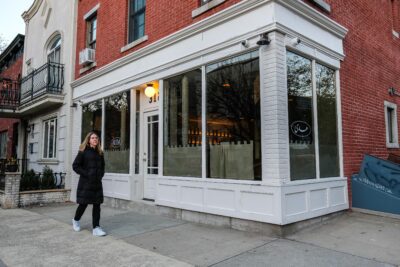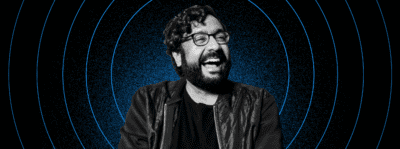Forging Creative One-Off (or Not) Collaborations at the Hum Series
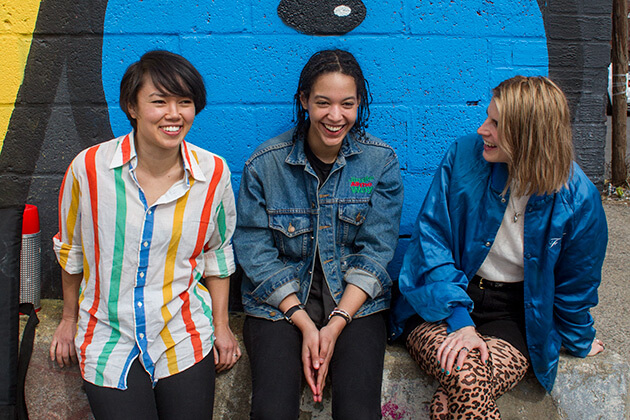

From left: Jen Goma, Zoe Brecher, Teeny Lieberson (Photos by Jane Bruce)
Cross pollination is so hot right now, with all sorts of unlikely birds-and-bees happenings brewing in Brooklyn. Adding to the tradition of temporary rock and pop matchmaking events like the Brooklyn Rock Lottery, HYPNOCRAFT (aka Rachael Pazdan) has put together the Hum Series which is forging collaborations between up-and-coming and established musicians alike.
Since the beginning of April, the series has been doing its thing every Monday at Manhattan Inn, a Greenpoint piano bar with about as much edge as a piano bar can possibly have, bringing together video projections with live music made by locals working as either solo musicians or in other band projects. And really there’s no reason you shouldn’t take advantage of this, because the cost of the entire series is entirely free, which is a super low price to see some really talented musicians if you ask us.
Collaborators include the likes of Erin Fein (Psychic Twin) and Alyse Lamb (EULA) to name a couple and they come from a variety of backgrounds including indie rock, R&B, and pop. But one thing unites each collaborator–they’re all women. “I noticed an absent platform for women making music in Brooklyn,” said Pazdan, “and I wanted to create shows that would organically fit into the concert climate and not stand out as something like Lilith Fair. It’s a community-spirited endeavor.”
Unlike events like the Rock Lottery, the musicians in this case have a hand in building their own bands and were given at least a couple of weeks to practice. We spoke with the residency’s organizer, Rachael Pazdan (who splits her time between working on performing arts programming at BRIC and producing live arts events of her own under what she calls her “super hero name,” HYPNOCRAFT) as well as three collaborators who came together just for the series and are performing tonight at Manhattan Inn: Zoë Brecher (Brainfreeze), Teeny Lieberson (TEEN) and Jen Goma (A Sunny Day in Glasgow).
The Hum Series was sort of a natural next step for Rachael who helped curate 3:1: An Artistic One Night Stand (“We stuck three Brooklyn based artists– choreographer, video artist, musician– together who had never met before into a hotel room for 24 hours to make an installation out of the room, accompanied by lobby performances”) as well as Screen/Sounds: Cosmic A/V Collaborations, which brought together musicians and local filmmakers to present live-scored films.
Rachael explained the all-female collaborator cast was inspired by her recent exploration of feminism. “I was admittedly on a kick of watching feminist films during the development of this project. I couldn’t stop reading about Gloria Steinem and am so inspired by her strength, boldness and confidence,” she recalled. “From all of this I think I naturally became more aware of the underrepresentation of women in Brooklyn’s music community and wanted to do something about it.”


Rachael Pazdan of HYPNOCRAFT, curator of the Hum Series (Photos by Jane Bruce)
If all goes well, Rachael is hoping the Hum Series could be an annual event. And in speaking with Teeny, Jen, and Zoë, it became clear they were all excited to have the opportunity to connect with a music community they knew existed, but that hadn’t had any practical means of meeting up.
The Hum Series has created a unique opportunity to try something different, work on old material, and harness new creative energy. And though the three are all strong vocalists in their own right, they come from very different backgrounds– Zoë is a bit more rock n’ roll whereas Teeny is all about synth-based pop psych and Jen is a bit more indie pop.
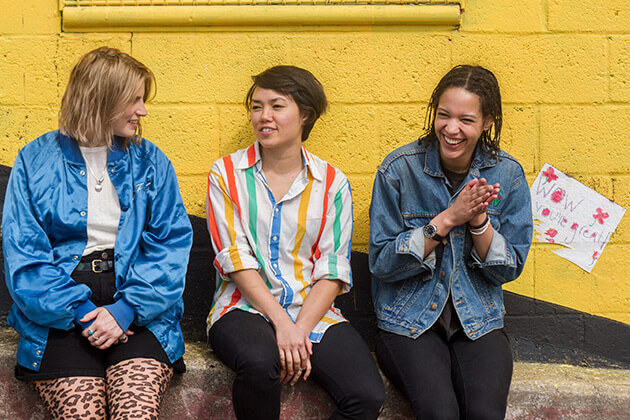

What are the three of you doing instrumentally?
Jen: We’re all singing and basically playing the exact same instruments we usually do.
Teeny: We both brought key boards so we’re sort of switching off.
Was it hard coming together or did you organically create a new sound?
Jen: It’s been really easy. We talked about how it could have been hard and how it was really nice that it hasn’t been hard. I feel like I know your music [Teeny] and your style so I was thinking of songs that could be good for us and good for Zoë, because she’s a really amazing drummer. And we want to have as much in the way of vocals as possible because we all sing, so it’s like we definitely have songs in our own cues. I definitely wanted to work on songs I knew you guys could do really well.
Teeny: It’s definitely vocal-based.
Jen: Except you really have to rip out a solo on the guitar, a really psychedelic solo. There will only be vocal shredding.
Did you feel like you were able to do more experimental stuff or things you wouldn’t normally do in your main project?
Zoë: Yeah I’m not used to working with synthesizers, and they’re playing two synths. So it’s two synths and then drums, which I’m not used to at all. I’m used to guitar, bass, drums. It just opened a whole new world for me and then I realized the stuff I love drumming to sounds like that, so it’s super exciting.
How do you feel about doing projects like this, something apart from your main projects, because in a way it’s not much pressure, you can kind of mess around more and experiment I guess?
Jen: Yeah, definitely.
Teeny: That’s why I wanted to do it.
Jen: We were talking about that yesterday, about how it’s just really nice to just bring songs to a kind of final end. Because there’s this thing when you perform it live, you’re kind of publishing it. It’s kind of nice to bring these songs to their final end and not pore over it, like ‘Oh is it worth it? Is it really the right thing?’ No, it’s just really nice to just work on music and get things finished in a few days. That’s very satisfying.
Teeny: It’s nice to play with people outside of your normal band too. And it’s also been nice getting to know you guys too.
Jen: Yeah we’ve had a lot of fun hanging out too, a lot of laughs.
Have you played together before?
Jen: No it’s our first time. Teeny and I met, like, a week before we got the email about it.
Teeny: We were at a house party with a mutual friend watching the Grammys.
Zoë: The first time I met everyone was at the photo shoot, which was pretty crazy. We had our first practice only last week, and it was my first time playing with them and it came together just super organically.
Is this the case for everyone involved in the series? Has anyone worked together before that you’re aware of?
Jen: Well I think it really runs the gamut because we went to the show on Monday the 6th and there were people who had worked together before just doing songs they’d done together before. Teeny and I have both done the Rock Lottery and we kind of compared it to that. Only with this, you get to choose the people to make up your new band with.
Zoë: I’ve never been a part of anything like this before, but I definitely want to do more stuff like this after.
How many practice total are you going to have before the show?
Zoë: In total just five practices before the show, but we’ve already talked about playing together after.
And have you felt any kind of unusual pressure, because that doesn’t seem like a lot of time to prepare?
Zoë: Definitely not, but I think that we’ve all had so much experience doing this that that’s kind of all we needed for this. I’ve had other bands where we need to practice three to five weeks in a row. It’s amazing that we can come in with an idea and 10 minutes later we have a full song written. It’s been awesome to work with them.
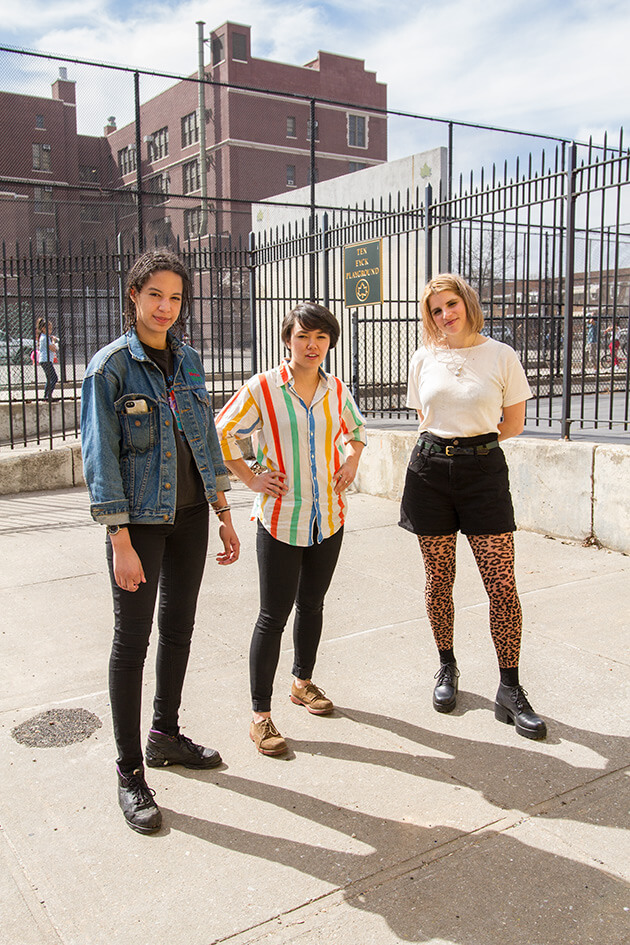

Why do you think you mesh so well?
Zoë: I think the three of us are just used to taking the lead role in our group so when we come together it just creates this powerhouse of talent I guess. They’re really, really good at communicating their ideas and I think we’re all really good at listening. So when the three of us come together it’s just amazing and I think we all have very similar styles as well. Everything I’ve played they liked and everything they’ve played, I’ve liked. So we just built from that.
How many songs have you written so far?
Jen: Five?
Teeny: But maybe ten, you know? We’ve been moving quickly but we’ve only had two rehearsals and it feels like we’re getting through the material pretty fast, so that’s cool.
Jen: I think that when you have a good perimeter, a good limit, I think that you can get exactly that amount done. It’s a lot harder when you’re like, well, where is this going? But it’s like no, this all needs to be done by 4/20 and I don’t actually think we can do more than six songs because it’s like three groups have to perform between the hours of 11 and 1 so we’re trying to keep it civilized.
What do you think about the venue, Manhattan Inn ? It’s kind of a strange venue in my mind, it’s pretty classy.
Jen: I think it’s awesome because it’s not a DIY venue that’s like a boys’ and girls’ club for adults. You know, a lot of DIY venues are like one clamp light and hot beers and it’s really nice to have a free show where there’s nice drinks, a nice sound system.
Teeny: Yeah, it’s comfortable you can sit down.
Jen: I don’t know if you know what Birdland is like. But this is probably the modern day Birdland [a Midtown jazz club] [laughs].
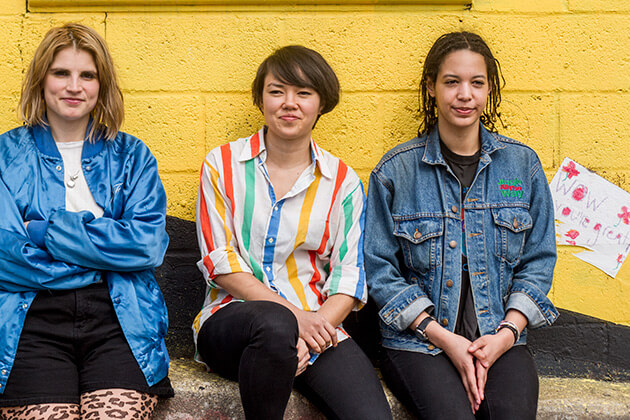

Does that have any effect on what you’re writing? Because Manhattan Inn is like a sit-down chill venue, as opposed to some DIY venue with a gritty vibe?
Teeny: I think we’re somewhat considering that, but not totally.
Jen: I also think that room is cool because it has whatever vibe you want to bring to it. I’ve seen people shred there, people show up that are full bands. I’ve done piano karaoke there. I think that’s actually what made me realize you can make that room to be whatever you want it to be, because everyone has to be so involved.
Like, that’s why everyone is there. No one is in that room just to talk to someone else. I think that’s what we’ve been talking about, it’s like– let’s just make really deliberate decisions and be like, OK guys this is what we’re doing.
Zoë: I’d definitely heard of it before, but I’d actually never been there. I’d seen pictures of the event, I guess it happened last Monday night and the week before, and it looked really quaint and super cute. So I’m excited to play there. Though I’m a little nervous about having loud drums play there.
Did this change the music, the fact that it’s so dependent upon a single event?
Zoë: I guess so, because you really have to trust who you’re working with, that this 30-second idea they have is going to blossom into something amazing. You know, of course if you have more time you can come up with something probably different and maybe better. But it’s such a testament to their talent to see what they can do in such a short time limit and I think that what they’ve come up with is really, really, really exciting and if we had more time it probably wouldn’t sound this way, so it’s pretty incredible.
What are your songs about?
Teeny: I guess there’s some old break up songs. But yeah, so far it’s been pretty loose.
Jen: We don’t have a mission statement in that sense, lyrically. It’s not like we should say something. It’s more of a cohesive vibe and I think the lyrics will come out of that.
Did you learn anything from this experience that you’ll bring back to your major project?
Zoë: I think this is one of the first times I’ve felt like I had an impact on the music community of New York. Like, I never thought that I would be part of such an incredible line up and it’s just shown that people value what I do and appreciate what I do and want me to be a part of this scene. So yeah, definitely.
Do you think you would collaborate again on stuff?
Jen: This is so funny it’s kind of being like on a dating show. At the end they’re like, ‘So is it true love?’ I guess I don’t want to say no. Yeah, I would do stuff again. We haven’t finished it yet, so something crazy could happen.
Teeny: I could turn into a psycho.
Jen: We could like break the white piano.
Teeny: That would be amazing.
Jen: Just destroy it, you know?
You might also like 














